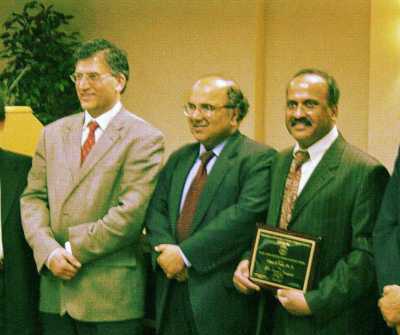 The Association of Scientists of Indian Origin in America honoured seven scientists for their accomplishments at ASIOA's 26th annual banquet, held recently at the Lion's Club of San Diego in California, on the sidelines of the Experimental Biology Conference. Nearly 100 delegates attended the event.
The Association of Scientists of Indian Origin in America honoured seven scientists for their accomplishments at ASIOA's 26th annual banquet, held recently at the Lion's Club of San Diego in California, on the sidelines of the Experimental Biology Conference. Nearly 100 delegates attended the event.
The Mario Toppo Distinguished Scientist Award went to Dr Ulhas Naik of the University of Delaware, the Dr Sudhir Gupta Young Scientist Award was presented to Dr Muthuvel Jayachandran of Mayo Clinic, College of Medicine in Rochester, Minnesota, the American Radiochemicals Junior Scientist Award in Pharmacology went to Dr Raj Sevak of the University of Texas Health Sciences Center in San Antonio, the Biotex Laboratories Junior Scientist Award in Immunology went to Dr Ashlesh Murthy of the University of Texas at San Antonio, the JOUGE Junior Scientist Award in Nutrition went to Dr Ganesh Halade of the University of Texas Health Sciences Center, the Dr Satu Somani Junior Scientist Award in Physiology went to Dr Sanjiv Dhingra of St Boniface General Hospital Research Center, Winnipeg, Canada, and the Dr Gopalkrishna Memorial Junior Scientist Award in Biochemistry went to Manish Taneja from the College of Pharmacy, University of Houston, Texas.
Dr Murali Pagala, chairman of the awards committee, introduced the honorees. Chief guest B S Prakash, India's consul general in San Francisco, presented the awards.
Dr Parimal Chowdhury, ASIOA president, welcomed the guests, introduced the chief guest and described the organisation's activities. He advised younger scientists to play an active role and bring new ideas to help the ASIOA reach its long-term objectives.
The audience observed a minute of silence in memory of Dr Sam Bhathena, a former ASIOA president, who died in February. Dr Gabriel Fernandes, executive officer, ASIOA, led the tribute. Dr Sudhir Gupta, professor of clinical immunology at the University of California at Irvine, and Dr Sujay Singh, chief executive officer of IMGENEX, arranged the banquet.
Prakash commended scientists of India origin in the US for their achievements and said many of them offer mentoring and do other things to enhance scientific progress in India.
Dr Vijay K Kuchroo, professor of neurology at the Center for Neurologic Diseases in Brigham and Women's Hospital of the Harvard Medical School in Boston, Massachusetts, was the keynote speaker. His work focuses on immune systems that turn on living things that result in problems like multiple sclerosis and type I diabetes. He has developed several strains of mice that serve as animal models for human diseases. Dr Gupta introduced him to the audience.
Dr Kuchroo advised young Indian scientists to develop well-disciplined work-habits, and aspire for bigger things in research through original thinking and multi-tasking. He suggested that Indian scientists teach specific courses and collaborate with their peers in India. Dr Krishna Agrawal, president-elect, ASIOA, and professor and chairman of the Department of Pharmacology at Tulane University in New Orleans, vowed to work harder to increase ASIOA's membership, and invited all to attend the ASIOA banquet that he plans to organise in New Orleans next April.
Dr Ulhas Naik said he would organise the third biannual ASIOA conference in Denton, Texas, in January and invited the members to attend. Dr S Dhandayuthapani, secretary-elect, ASIOA, proposed the vote of thanks.
 |
ASIOA is a non-profit organization, established to promote professional interaction between Indian scientists, engaged in biomedical research in US/Canada and in India. Most of its members are professors at graduate and medical schools, and scientists at national research laboratories, medical centers, or the pharmaceutical industry. Some of its members have testified at Congressional committees on scientific matters, and served in US administrations.
ASIOA (www.asioa-inc.com) members visit research laboratories in India, give scientific lectures, and help transfer technology there. In the US, they train new immigrants of Indian scientists and doctors in biomedical research. They also provide laboratory facilities and guidance to young Indian students who are in high school or college to undertake research projects during summer.
Image: Officials, guests and award winners at the banquet. From left: Vijay Kuchroo, India's Consul General in San Francisco B S Prakash and Ulhas Naik.





